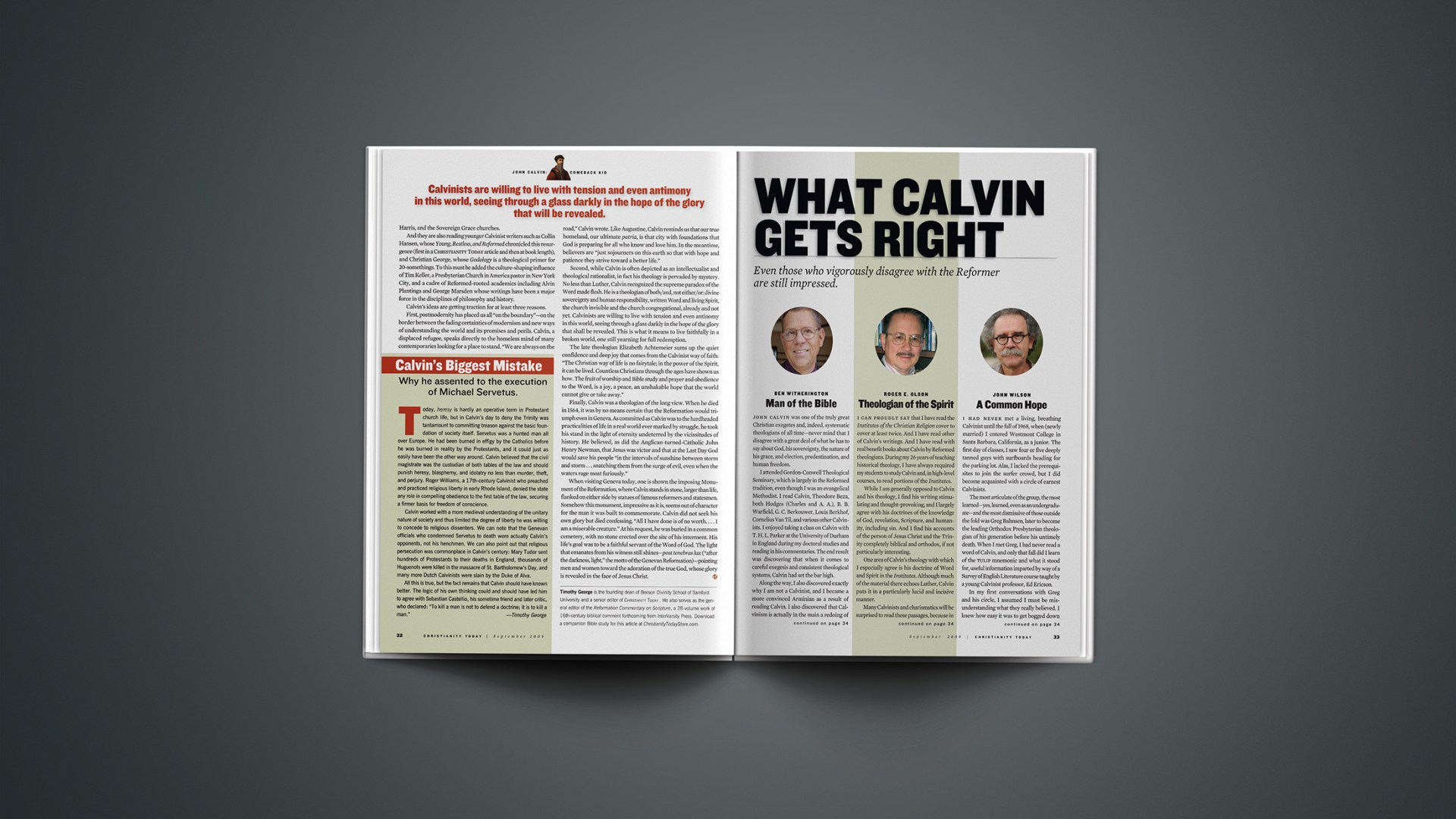I can proudly say that I have read the Institutes of the Christian Religion cover to cover at least twice. And I have read other of Calvin’s writings. And I have read with real benefit books about Calvin by Reformed theologians. During my 26 years of teaching historical theology, I have always required my students to study Calvin and, in high-level courses, to read portions of the Institutes.
While I am generally opposed to Calvin and his theology, I find his writing stimulating and thought-provoking, and I largely agree with his doctrines of the knowledge of God, revelation, Scripture, and humanity, including sin. And I find his accounts of the person of Jesus Christ and the Trinity completely biblical and orthodox, if not particularly interesting.
One area of Calvin’s theology with which I especially agree is his doctrine of Word and Spirit in the Institutes. Although much of the material there echoes Luther, Calvin puts it in a particularly lucid and incisive manner.
Many Calvinists and charismatics will be surprised to read these passages, because in them Calvin rests all true knowledge of God on the inner testimony of the Holy Spirit. In my experience, too many Calvinists talk too little of the Holy Spirit, while too many Pentecostals and charismatics know little to nothing about Calvin’s emphasis on the third person of the Trinity.
According to Calvin, all positive knowledge of God derives from Scripture, and all truth claims about God must be judged by Scripture. But the authority of Scripture rests on the Holy Spirit, who inspired it, and a valid understanding of Scripture rests on the enlightenment of the Holy Spirit.
Calvin was no charismatic, but he was closer to it than some Reformed people readily admit. At least one does not read much about the crucial role of the Holy Spirit in their own interpretations of Calvin’s theology. This Arminian, raised Pentecostal, deeply admires and enthusiastically applauds the attention Calvin himself gave to the Spirit by basing even the authority of the written Word on the Spirit and his work.
At the same time, of course, Calvin also warned against basing any truth claims about God on ecstatic revelations claimed to be from the Holy Spirit. This is a relevant warning against modern-day prophets who say things like, “The apostle Paul would be surprised if he knew the things the Spirit is teaching today.” According to Calvin—and I agree with him—the Spirit does not reveal new truths; the Spirit and the written Word are interdependent and inseparable.
Classical Arminians have always agreed with Calvin and the best of Reformed theologians about the dialectic of Word and Spirit—in spite of our profound disagreement with him about God’s role in the fall of Adam and the reprobation of the wicked, which to us inevitably makes God the author of sin in spite of denials by Calvin’s fans.
Roger E. Olson is professor of theology at Truett Theological Seminary, Waco, Texas.
Copyright © 2009 Christianity Today. Click for reprint information.
Related Elsewhere:
This article appeared in the September 2009 issue of Christianity Today as part of the series “What Calvin Gets Right: Even those who vigorously disagree with the Reformer are still impressed.” Other articles in the series include:
Man of the Bible | When it comes to careful exegesis and consistent theological systems, Calvin set the bar high. By Ben Witherington
A Common Hope | Much of ‘Calvinism’ is simply Christianity. By John Wilson
Other articles on Calvin appearing in the September 2009 issue include:
John Calvin: Comeback Kid | Why the 500-year-old Reformer retains an enthusiastic following today.
The Reluctant Reformer | Calvin would have preferred the library carrel to the pulpit.
Calvin’s Biggest Mistake | Why he assented to the execution of Michael Servetus.
More on Calvin is available in our full coverage area.










